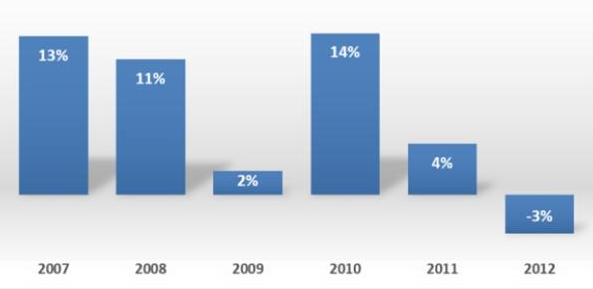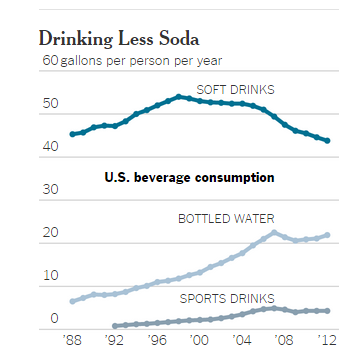PEST Analyses

Political Factors Any corporation of a size of Dell is impacted by a set of political factors such as the level of political stability in the country, home market lobbying and international pressure groups. It is important to note that to date there is no evidence of Dell being involved in a political issue, nevertheless, the company is not immune from detrimental impact of political factors in the future. Specifically, there is a risk for Dell and other US-based computing and technology companies to become unwelcome in certain markets, particularly in Russia and China due to spying concerns sparkled mainly after the revelations of whistleblower and former CIA employee Edward Snowden. Moreover, Dell might be impacted by activities of home market lobbying and pressure groups in emerging economies advocating the interests of local computer firms, thus creating barriers for Dell in forms of trade tariffs and other instruments. Economic Factors Dell is directly impacted by a great range of economic factors that include currency exchange rates, interest rates, inflation rate, macroeconomic stability and costs of labor and raw materials. Particularly, currency exchange rate represents a major economic factor that affects Dell business performance directly and significantly because of the global scope of Dell operations. In order to address the negative impact of currency exchange rate and to gain operational efficiency, in February 2015 Dell became the biggest company that accepts bitcoins internationally[1]. Moreover, the global financial and economic crisis of 2007 – 2009 proved to have substantial detrimental impact on the growth of the global PC market, thus affecting Dell’s revenues. As it is illustrated in Figure 3 below, the growth in the global PC market amounted to 13% in 2007, however in 2009 the global PC market grew only 2% as a direct result of the crisis. It…

Political Factors Coca Cola is impacted by a set of political factors, both, in the US and abroad. These include, but not limited to the level of political stability in the country, impact of international pressure groups and domestic market lobbying groups and the government attitude towards the industry and the company. There are few specific instances that illustrate the impact of political factors on Coca Cola performance. “One Day without Coca Cola” campaign launched by University organizations of the Social Nicaraguan Movement was a protest against the US-led invasion of Iraq with an inevitably negative impact on Coca Cola revenues in respective markets[1]. Similarly, Israeli attacks on Gaza in 2014 have caused some of the businesses in Turkey and more than 100 hotels in Mumbai stop selling products of Coca Cola Company[2]. Economic Factors Coca Cola sales are impacted by a set of economic factors that beyond of company’s control. These factors include the level of economic growth in the country and in the industry, tax rates and currency exchange rates, interest rates, labor costs and others. The global economic and financial crisis of 2007 – 2009 is a relevant example of an economic factor that greatly impacted the majority of businesses around the globe. However, the crisis has impacted Coca Cola to a lesser extent compared to many other businesses. Its operating margin remained at industry-front 22% despite the crisis, although dividend yield was reduced to 2.6%[3]. Arguably, fluctuations in exchange rate is the most significant economic factor that has adversely impacted Coca Cola performance in recent years. For example, due to severe currency devaluation in Venezuela, Coca Cola’s reported profits in this market has to be reduced by 55% in the fourth quarter of 2014 and there are similar instances in other parts of the world[4].…

PESTEL analysis can be explained as “a checklist to analyse the political, economic, socio-cultural, technological, environmental and legal aspects of the environment” (Rao et al., 2009, p.115). The framework assists with analysis of the impact of each of these individual aspects of external environment to be used in decision-making by senior management. PESTEL analysis for Warner Bros. is illustrated on the following table: Political Political situation in the US and foreign markets Censorship on media and entertainment in emerging markets Impacts of lobbying groups in film and entertainment industry Effects of industry pressure groups Economical Impact of US foreign trade deficit issue Resign costs of advertising Level of US unemployment Inflation rate in the US Changes in the US taxation system Social Value changes in the US and other market Increasing influence of internet on social life Changes in demographic challenges Increasing importance of work-life balance Acceptance of same-sex marriages by increasing numbers of states in the US Technological Increasing popularity of 3D technology Maturation of films in DVD format Emergence of innovative platforms to consume entertainment products Increasing integration of IT in various stages of film production Technological breakthroughs in film production Ecological Problems associated with global warming Rising environmental concern of people globally Increasing importance of eco-tourism and related issues Increasing importance of corporate social responsibility (CSR) Legal Licensing issues with other organisations in the industry Problems related to intellectual property Legal barriers to enter emerging markets Changes in the US rules and regulations in relation to films and entertainment industry. Warner Bros. PESTEL Analysis References Rao, C.A., Rao, B.P. & Rao, K. (2009) “Strategic Management and Business Policy: Text and Cases” Excel Books

PESTEL stands for political, economical, social, technological, environmental, and legal factors affecting the business. The following table contains major factors within PESTEL analysis: Political Political stability in the UK Changes in US and UK ‘special relationships’ and their impact on multinational business Economical USD:GBR exchange rate Inflation rate in the USA and UK Rate of unemployment in the UK Macroeconomic changes in the UK Social Demographics shifts in the UK Changes in traditional work patterns Increasing level of multiculturalism amongst consumers Shifts in Consumer Values Technological Advent of innovative technology in catering industry Patenting issues associated with technology Environmental Environmental ‘green’ groups and the level of their influence on consumers Global warming, the issues of sustainability Legal Changes in UK rules and regulations in relation to corporate governance Business policies to be introduced by the EU Legal implications of the current tax row

GlaxoSmithKline PESTEL Analysis. The level of implementation of GlaxoSmithKline (GSK) marketing strategy is subject to a range of external and internal factors that shape overall marketing environment for the business. PESTEL strategic analytical tool can be used to study the impacts of external factors to the business where the abbreviation stands for political, economical, social, technological, ecological, and legal factors. Political factors affecting the implementation of GSK marketing strategy include possible changes in international trade regulation and competitive regulation likely to be introduced by the governments of China and India. Economic factors impacting GSK marketing strategy include high rate of economic growth in China and India. Moreover, current economic uncertainties associated with European markets might have negative implications on the marketing strategy Social factors with potential implications on GSK marketing strategy are changes in consumer lifestyles, shifts in consumer attitudes and opinions etc. However, Cameron (2012) specifies increasing level of customer resentment towards large amounts of profits made by pharmaceutical companies and sliding images of large pharmaceutical companies as the most significant social factor in the current environment. Technological factors include breakthroughs in pharmaceutical industry, issues associated with licensing and patenting drug manufacturing technology, as well as, the level of development of industry technology. Ecological factors also have specific implications on GSK marketing strategy that include problems related to global warming, and impact to the environment of GSK activities, and the reaction of stakeholders to this impact. Legal factors as one of the most important factors involve rules and regulations directly and indirectly related to GSK operations in local markets, as well as, European law and international trade rules, regulations and agreements.

Caffe Nero PEST Analysis. A macro-environment represents those factors and forces over which the organization has least control. They are the forces and factors which give rise to perhaps the greatest opportunities and threats facing organizations. For example, Globalization means that there is always the threat of substitute products and new entrants. The wider environment is also ever changing, and the marketer needs to compensate for changes in culture, politics, economics and technology. Economic Factors As a member of the Marketing Department in Caffe Nero, one has to understand the effects of the many economic variables that are likely to affect the business operations of the company. These factors are almost out of the company’s control, therefore, the company must prepare to change with those changes in order to survive and grow in the future. The likely factors that may affect Caffe Nero are the inflation rates, income expenditure of the population where the company operates, exchange rates that affects the coffee prices as the coffee is supplied from abroad. In case of Caffe Nero, as long as its majority of the operations are in theUnited Kingdom, it is not hugely vulnerable to inflation rates as theUKeconomy tends to be more reliable than most other countries. However, the interest rate fluctuations that is putting pound sterling much lower than the previous US Dollar exchange rates is most likely to affect Caffe Nero as most of the suppliers are willing to accept the US Dollar. Therefore, the cost of the coffee is significantly higher than before. Political Factors Operations of the company are most likely affected by the changes in the laws within which the business operates. The relationship between the country the company operates in and its supplier is also determinant of the possible future business deals and activities…

Political Analysis Although it may not be the ‘credit crunch ’ and the restriction of credit itself that has an impact on SME survival, but rather the consequences arising from the recession, the difficulties may lie with downturn in trade leading to reduction in cash flow and turnover. (Ma and Shumin 2010) A Pestle analysis is therefore necessary to relay any future potential issues. Economic Analysis With the current state of the economy Acme Whistles Ltd has managed to avoid the negative impact of the recession by having the demands of the B2C customer as well as the B2B customer and offering a range of whistle products they appeal considerably to their particular target market. It is important in this particular economic climate to be aware of emerging markets entwined which consequently transforms to potential global competition where levels of resources could allow a level of some type of cost advantages and as well as cash flows for research and development. Social Analysis With emerging markets likeChinaandIndia, comes the demand for new products as well as the careful consideration for the needs and wants of the various types of customers. In additions customers across the globe are constantly moving towards being more environmentally conscious therefore careful deliberation has to be taken to determine what product is best suited to a particular market. Legal Analysis Even though one of Acme ‘s competitive advantages is that it has a range of patented designs which span back to the 1880’s it currently also has the longevity as well as the popularity in form of large customer base (both domestic and business) spanning across 120 countries. Evidently with low cost producers as well Acme Whistles existing and evidently with this particular climate, it might be difficult to exist or enter the…

PESTEL stands for political, economical, social, technological, ecological and legal factors affecting a business and it is used for the purposes of analysing external factors affecting the business. PESTEL analysis for Guest-Tek entry into the Russian marketplace is summarised into the following table: Political Level of political stability in RussiaLevel of bribery in RussiaLevel of risk of military conflicts involving Russia Levels of corporate and consumer taxation in Russia Consumer protection practices in Russia Pressure groups lobbying the interests of local businesses Economical Level of economic growth in RussiaFluctuations in oil prices that affect Russian economyThe level of inflation rate in Russia Special tariffs related to the broadband services Fluctuations in exchange rate between Canadian Dollar and Russian Rouble Minimum wage in Russia Social Severe demographic issues in RussiaVast cultural differences between North American and Russian consumersChanging lifestyle patterns Consumer buying patterns in Russia Technological The level of broadband infrastructure in RussiaThe uses and costs of energyLife-cycle of the relevant technology Potential for innovation in Russian marketplace Environmental Ecological and environmental regulationLevel of influence of various environmental groupsEnvironmental impact of Guest-Tek business activities in Russia Legal Russian employment lawsLevel of competitive regulationBroadband industry specific rules and regulations in Russia

PESTEL stands for political, economic, social, technological, environmental and legal factors that affect the business and it is considered to be an effective tool for analysing external environment for the business. Each of the factors presented below has to be critically analysed by the management of Jamie’s Italian Sydney in order to identify new potentials for creating competitive edge for the company. PESTEL analysis for Jamie’s Italian is presented on the following table: Political The level of consumer protection The level of political stability Market lobbying and pressure groups in Sydney International pressure groups Risk of military invasion Economical The level of economic growth in general The level of growth in catering industry The level of taxation Government spending Seasonality and weather issues Inflation rate Australian dollar exchange rate Minimum wage rates Social Changing family patterns Changes in lifestyle trends Healthy eating trends Consumer demographics in Sydney Activities of vegetarian and vegan groups Consumer attitudes and opinions The level of education of consumers Consumer preferences in catering industry Population growth rate in Sydney Technological Technology development in catering industry The level of research funding by the government and private sector The level of energy use and associated costs Associated and dependent technologies The potential for innovation in catering industry Environmental Ecological and environmental regulation in Australia The activities of various environmental groups Legal Taxation legislation in Sydney (both, corporate and consumer) Catering-specific rules and regulations Employment laws in Sydney Competition regulation

PESTEL is one of the most effective strategic analytical tools available that can be used for analysing the external environment for the business (Klein, 2007). The abbreviation stands for political, economical, social, technological, environmental, as well as, legal factors that affect the business. The following table illustrates the PESTEL analysis conducted for Oracle Corporation in UK marketplace: Political Environmental regulations and protection Tax regulations International trade regulations The level of consumer protection The level of political stability Health and safety regulations Contract enforcement regulations Economical Taxation The level of economic growth Interest rates UK monetary policies Unemployment rate and relevant policies GBP:USD exchange rate The level of government and consumer spending Social Social values The nature of income distribution Demographic tendencies Social mobility of labour Work-career balance The level of consumer education Personalities of opinion leaders Technological Technological breakthroughs in related to the software industry Research and development The level of energy use and associated costs Innovations in information technology The duration of technology life-cycle Environmental The activities of non-government environmental groups Global warming issues The impact of Oracle on environment and its consequences Legal Rules and regulations specific to the software industry Other government regulations affecting Oracle in direct and indirect ways References Klein, G. (2007) “Strategic Marketing” GRIN Verlag
